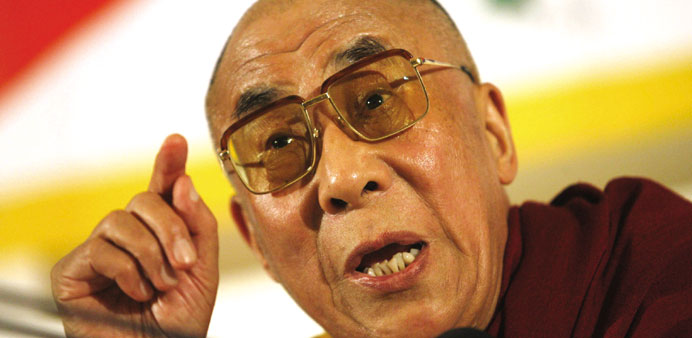AFP/Berlin
Tibet’s exiled spiritual leader the Dalai Lama has criticised Russia’s President Vladimir Putin as “self-centred” in a German newspaper interview yesterday, saying Putin seems to want to “rebuild the Berlin Wall”.
“His attitude is: ‘I, I, I’,” the Dalai Lama said, pointing out that Putin had served as Russian president, then prime minister and then president again.
“That’s a bit too much,” he told the Welt am Sonntag newspaper. “This is very self-centred.”
The Buddhist leader also had more criticism for Russia, now in the worst stand-off with the West since the Cold War, than for China, which has ruled Tibet since its 1950 invasion.
“China and Russia, these are two very different cases,” said the Dalai Lama, voicing hope that “the modern world supports China becoming a democratic country”.
“China wants to be part of the global political system and will be ready to accept the international rules in the long run,” he said in the interview conducted in English. “I don’t have the impression that this accounts for Russia and President Putin, as well, at the moment.”
“We had become accustomed (to the fact) that the Berlin Wall has fallen,” he said, alluding to the shattering of the Communist bloc begun 25 years ago. “Now President Putin seems to want to rebuild it. But he is hurting his own country by doing this. Isolation is suicide for Russia.”
The Dalai Lama also told the newspaper that he should be the last Tibetan spiritual leader, ending a centuries-old religious tradition from his Himalayan homeland.
His comments echo his previous statement that “the institution of the Dalai Lama has served its purpose”, but were even more explicit.
“We had a Dalai Lama for almost five centuries. The 14th Dalai Lama now is very popular. Let us then finish with a popular Dalai Lama,” he said.
“If a weak Dalai Lama comes along, then it will just disgrace the Dalai Lama,” he added with a laugh.
He also said: “Tibetan Buddhism is not dependent on one individual. We have a very good organisational structure with highly trained monks and scholars.”
China has governed Tibet since 1951, a year after invading, and the Dalai Lama fled across the Himalayas to India after a failed 1959 uprising against Chinese rule.
The Nobel Peace Prize winner in 2011 retired from political duties and has upgraded the role of prime minister of the Tibetan exile community.
But he is still the most powerful rallying point for Tibetans, both in exile and in their homeland, and remains the universally recognised face of the movement.
Asked by the German newspaper how much longer he may carry on his advocacy duties, the 79-year-old said: “The doctors say I could become 100 years old. But in my dreams I will die at the age of 113 years.
“I hope and pray that I may return to this world as long as sentient beings’ suffering remains. I mean not in the same body, but with the same spirit and the same soul.”

